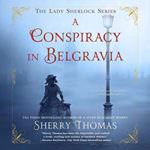 Narrated by Kate Reading
Narrated by Kate Reading
This is the first book in Ms Alexander’s nine (so far) book Lady Emily series of mysteries set in the late Victorian era, but is the most recently recorded of the set. A look around Audible (US) shows that Book 2 (although it’s not labelled as such) is available, as are Books 6-9 and a couple of series novellas. I believe Book 3 (A Fatal Waltz) is scheduled for release soon, although unfortunately without Kate Reading at the helm.
At the beginning of And Only to Deceive, Lady Emily Ashton, a young widow, is soon to reach the end of the mourning period for her husband Philip, who died while on safari in Africa shortly after their marriage. Her obnoxious mother is continually nagging at her that she is not mourning seriously enough because she doesn’t keep the front curtains continually closed or wear undiluted black all the time while simultaneously reminding Emily that she will soon be able to marry again. Her mother’s continual nagging is what led Emily to marry Philip Ashton in the first place – she didn’t really care much for him, but he was young, well off and handsome, and marriage was the only way Emily could get away from her mother and have a life of her own.
But now Emily has other ideas. She doesn’t want to remarry and is quite happy to remain a widow as she wants to pursue the interest in antiquity that has been awoken in her by the discovery of a number of artefacts and books in Philip’s possession. She regularly visits the Greco-Roman galleries at the British Museum and strikes up a friendship with the director of the collection; she starts reading Homer (in translation) and then to learn to read ancient Greek so she will be able to read the originals. All of these things horrify her mother, who laments that nobody will want such a bluestocking for a wife and insists Emily won’t be happy without a husband.
Emily is encouraged in her quest for an education in the classics by Philip’s oldest and dearest friend, the handsome and charming Colin Hargreaves, a man for whom she finds herself feeling more than a frisson of attraction. But as Emily delves more into her late husband’s diaries and pursues her studies, she learns about stolen and forged artefacts, and discovers a ring of art forgers which is somehow related to Philip and his friends – and in which it seems that Colin may be involved up to his neck.
The mystery is intriguing and I especially enjoyed the background of Emily’s growing fascination with ancient Greece and her interest in the art, sculpture and literature of the period. I did, however, find the girl-band sleuthing team of Emily and her friends to be overly twee; rather like a Victorian version of Charlie’s Angels (had there been four of them!) – the brains (Emily), the experience (Cécile), the sexy one (Ivy) and the outsider (Margaret).
There are romantic elements to the story, although as with Deanna Raybourn’s Lady Julia or Anna-Lee Huber’s Lady Darby, these are secondary and are developed over a number of books. In fact, one of the most unusual facets of the story is the “romance” that develops as Emily comes gradually to know and love Philip only after his death. His diary entries show her that he was a man deeply in love, a fact of which she’d been completely ignorant, believing him to be rather dull. The diaries also remind her of how detached and dispassionate she had been.
Emily also has a couple of live suitors to contend with – Colin Hargreaves and Andrew Palmer, a charming rogue who make his interest in Emily immediately apparent, and to whose light-hearted flirtatiousness she gravitates in the face of Colin’s sometimes sober manner and his frequent and mysterious absences.
Emily is a difficult character to warm to, especially in the early stages of the story. Her obvious disregard for the man she married, her air of arrogance and invulnerability and her insistence on going against the mores of society for the sake of it rather than for any particularly good reason make her seem rather abrasive and occasionally petulant, rather like a child stamping its foot than a grown woman. That said, her desire to throw off the shackles of her incredibly domineering mother makes that aspect of her personality quite believable, and Emily does redeem herself when she acknowledges that some of her actions are those of a deliberate rebellion, and that perhaps sometimes she goes too far. Kate Reading brings out this particular aspect of her character very well, however, her tone clipped and slightly hard-edged while hinting that underneath, is a woman who isn’t quite as worldly as she would like to believe.
Colin and Andrew are portrayed very distinctly and in ways which accurately sum up their characters. Colin’s speech is measured; he’s a man who thinks before he speaks or acts and who is used to being circumspect, whereas Andrew is more flamboyant and impulsive, qualities which are reflected in his more bluff, openly humourous tone. There is a large cast of supporting characters, all of whom are clearly differentiated and appropriately characterised, ranging from the girlish, light timbre given to Emily’s newly-wed friend, Ivy Brandon and the forthright speech of Margaret, the American bluestocking; to the softly spoken Mr Murray, curator of the Greco-Roman collection at the British Museum, and the less refined accents of Mr Attwater, expert forger. When the story shifts to Paris, Ms Reading’s accent follows accordingly – there’s even a cameo by Pierre Renoir – although I have to confess that the accent she employs for the half-Italian, half-French drawing master, Jean Pontiero, while appropriately mongrel-like was a little too mangled for my taste. That really is my only criticism with the performance however, and the character appears only a few times, so it wasn’t a major issue.
I suspect the expert narration may have helped me to gloss over some of the flaws in the storytelling and characterisation, which lacks depth overall. Lady Emily is a problematic heroine, and one I’m not sure I particularly like, given her tendency towards the TSTL on occasion and her insistence on being outrageous for nothing more than the sake of it. In spite of those reservations however, I did enjoy listening to And Only to Deceive, and would certainly suggest it might be of interest to fans of historical mysteries that include a dash of romance. But personally, I don’t think I’ll be continuing with the series, especially as a different narrator is on board for the next book.
Caz
Narration: A-
Book Content: B-
Steam Factor: You can listen out loud
Violence: None
Genre: Historical Mystery/Romance
Publisher: Tantor Audio
And Only to Deceive was provided to AudioGals by Tantor Audio for review.




I haven’t listened to this yet, but I agree with you about Lady Emily. Unlikable from the get-go….oh and her mother is annoying too!
I forgot to say….thanks for the great review!
You’re welcome :) I can certainly say that Emily had good reason to be the way she is, to start with, and I think she’d mellowed a bit by the end of the book, but I wasn’t so taken with her – or Colin – that I’m compelled to carry on with the series. Especially as book 2 is narrated by Justine Eyre (not a fan) and the new one uses Charlotte Anne Dore, who didn’t impress me at all in My Beautiful Enemy. Had Kate Reading been narrating, I would probably have listened to more at some point.
I finished this a couple of months ago and I was not a fan of Lady Emily. She came off as too arrogant for my tastes with no charm to redeem her.
Like you, I felt the narration was so good it made up for the lack in Lady Emily’s character. I don’t feel like reading any more of the series after this book.
*nods*. There were times I felt that Deanna Raybourn’s Lady Julia was a pain in the arse, but at least those books had Brisbane to make up for it! I did enjoy the mystery side of this one, but like you, am not motivated to listen to any more in this series, especially as the narrators aren’t ones I’ve found particularly enjoyable in the past.